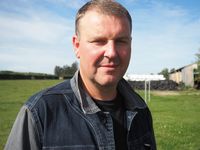EMB Newsletter November/December 2018
Newsletter as PDF
Contact
EMB - European Milk Board asbl
Rue de la Loi 155
B-1040 Bruxelles
Phone: +32 - 2808 - 1935
Fax: +32 - 2808 - 8265
Dear dairy farmers, dear interested parties,

In solidarity and with one voice
The associations of the European Milk Board (EMB) held their Members' Assembly in the Black Forest ten days ago, where they discussed the current situation. The reports of dairy farmers – from the Netherlands to Lithuania – are similar: Farms in many places are financially at the end of their tether. This year's drought has only made things worse and has further decimated farms already running on savings. After a number of difficult years, farmers have burnt through their financial reserves. Farms are going out of business every day, morale among farmers has hit rock-bottom and it is no surprise that young farmers see no future in the sector.
It is disappointing to see that concrete solutions are still slow to come from EU policy-makers. The Member's Assembly was unanimous about cost-covering prices and fair producer income being the only way to guarantee milk production in the long-term. The EMB is going to continue to strive for cost-covering milk prices and to ensure that effective crisis instruments are included in the Common Agricultural Policy.
The words 'solidarity' and 'fair' were heard very often at the Assembly. The unity and team spirit of European colleagues to work toward a stable market was plain to see, as was their solidarity toward producers in developing countries. Milk powder from overproduction in Europe should not end up flooding local markets in Africa!
For many years now, the EMB has spoken in favour of a fair trade policy and against milk powder exports at dumping prices. In October, two of our colleagues were in Burkina Faso in West Africa to support African small farmers in their efforts to strengthen local structures.
This newsletter also includes a report from this trip with impressions from a completely different world, which is, nonetheless, confronted with some of the same problems. Overproduction in Europe is driving farming, here and beyond, into the ground.
Erwin and Adrien – Thank you very much for your efforts in West Africa. I am proud of you and your commitment!
Boris Gondouin, member of EMB Executive Committee and APLI
"We call for a responsible dairy policy and an effective structure for the Common Agricultural Policy of the EU"
Travel diary Burkina Faso – Week of solidarity among producers
French dairy sector companies: They have achieved turnover equivalent to 8 years in just 7!
Solidarity - Farmers across Europe working towards the same goal
BDM Regional Team for Bavaria at the heart of European policy-making
What's the matter with the dairy sector?
Impressum
European Milk Board asbl
Rue de la Loi 155
B-1040 Bruxelles
Phone: +32 2808 1935
Fax: +32 2808 8265
E-Mail: office@europeanmilkboard.org
Website: http://www.europeanmilkboard.org






